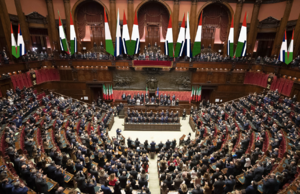Constazione Repubblicana
Constazione Repubblicana | |
|---|---|
| Type | |
| Type | |
| History | |
| Founded | November 21, 1503 |
| Leadership | |
Parlante | TBD |
Prime Minister | |
Leader of the Government | TBD |
Leader of the Opposition | TBD |
| Structure | |
| Seats | 715 445 party list seats 270 electorates (single-member, instant-runoff) |
 | |
Political groups | Government (TBD):
Pacitalian Social Democratic Congress: 340 seats
Main opposition (171): Christian Democrats: 171 seats
Third parties (204): eDemocrats: 74 seats
Defence of the Republic: 34 seats
Empordian Socialist Party: 31 seats
Empordian League: 25 seats
Podemos-Derecha Unida: 14 seats
Freedom and Solidarity for Marquería: 7 seats
Federation of Progressive Democrats: 6 seats
Empordian Green Party: 6 seats
Radical Anticapitalists: 4 seats
Pacitalian Green Party: 3 seats
|
Length of term | 3 years |
| Elections | |
| Mixed-member proportional representation | |
First election | 1503 |
Last election | 2020 |
Next election | 2023 |
| Motto | |
| PROPONIMVS • DELIVERAMVS • PERFICIMVS "We propose, we deliberate, we carry out" (Latin) | |
| Meeting place | |
 | |
| Interior of the Constazione chamber | |
 | |
| Exterior of the Prado, the Pacitalian parliament building, in Timiocato | |
| Website | |
| gov | |
 |
|---|
| This article is part of a series on the politics and government of Pacitalia |
|
|
The Constazione Repubblicana is the lower house of the bicameral Pacitalian parliament and, with the Senato Repubblicana, one of two deliberative bodies of the country's legislative branch.
The word constazione does not have a direct translation to English. It is likely a cognate of an occidental Latin word, constata, roughly meaning "to find" or "to observe". In modern Pacitalian, the word roughly translates to "estates" or "courts", giving it a similar name to many other junior chambers around the world, such as the Spanish Cortes Generales, or neighbouring Scandonia's Staten-Generaal.
The Constazione's role in the parliamentary process is to introduce and debate legislation. Legislation that is passed by the Constazione moves to the Senato afterward, and then to the Archonate of the Pacitalian Republic for republican assent. Most legislation is advanced by the government, though opposition members also have the ability, albeit less frequently and freely, to introduce motions or legislation that can be debated and voted upon.
The Prime Minister, who is the head of government in Pacitalia's parliamentary system, is typically the leader or general secretary of the largest party in the Constazione, though the Archonate will accept an agreement to form a coalition government from any of the 715 members who is able to command the confidence of a majority of the chamber.
Similarly, the parlante (Speaker) of the Constazione is usually selected from the governing party, though the role can technically be filled by any of the 715 members. At the beginning of each parliamentary term, a Speaker is elected from among the assembled lawmakers. There are no term limits for the parlante.
Like in other countries, many members are named to parliamentary committees that are intended to study proposed legislation in more detail, hear from stakeholders and relevant parties, and subsequently, either vote for legislation to be tabled for the wider body, or simply make recommendations. When the entire Constazione meets, such as to vote on legislation, this is referred to as a plenary session.
The 715 elected members are referred to as members of the republican parliament (MRPs). Pacitalia uses mixed-member proportional representation to elect MRPs. Voters have two votes: one for their preferred party and one for a local representative. The majority of seats, 445, are filled via the party vote; the other 270 are divided geographically into electorates where a single member is returned to the Constazione via instant-runoff voting. In the latter, voters rank candidates by preference to ensure that the winner has a majority of support when first-preference and other votes are tabulated.